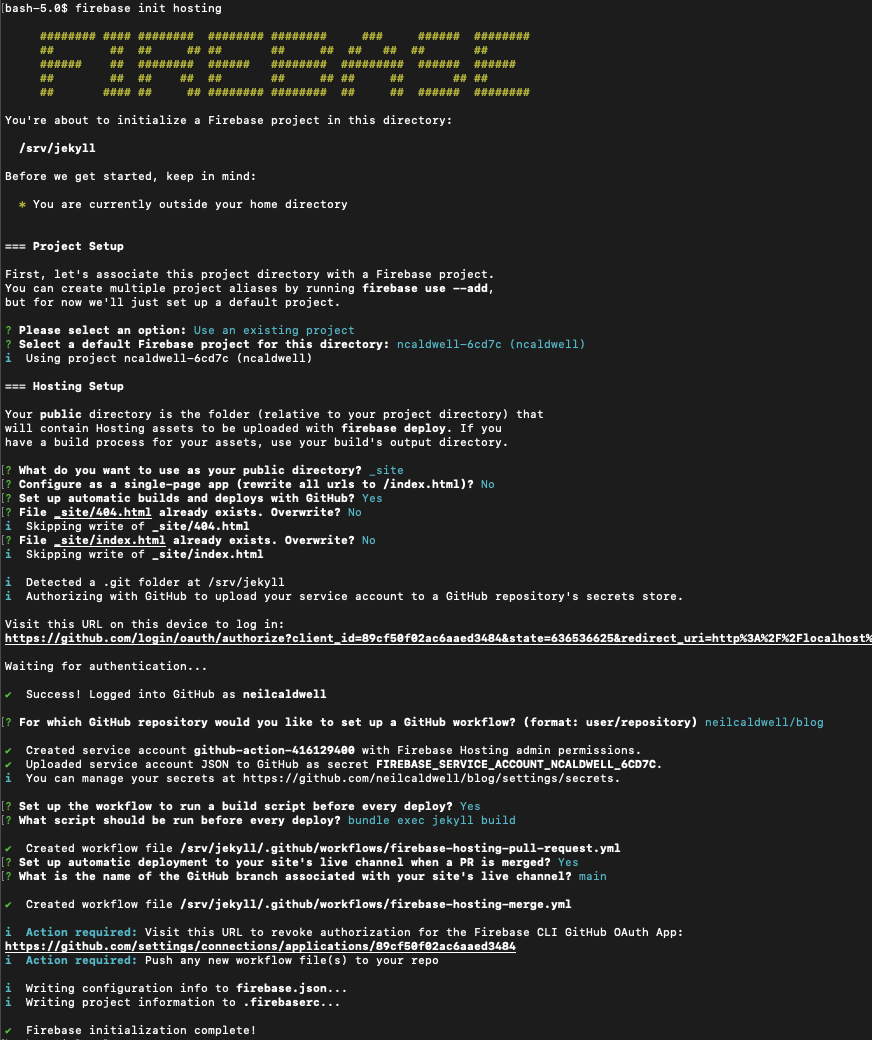Jekyll onto the clouds!
So, I last attempted to setup a azure dev ops pipeline, to build my jekyll site into a web app, without complete success. I then investigated Azure Static Web Apps, which may well offer a suitable solution to hosting a blog/personal website.
As I had my jekyll site running locally, using a local docker image on my MacOS.
I followed these steps essentially:
Create the application
- Navigate to the Azure portal
- Select Create a Resource
- Search for Static Web Apps
- Select Static Web Apps
- Select Create
On the Basics tab, enter the following values.
- Property Value
- Subscription Your Azure subscription name.
- Resource group jekyll-static-app
- Name jekyll-static-app
- Plan type Free
- Region for Azure Functions API and staging environments Select a region closest to you.
- Source GitHub
Select Sign in with GitHub and authenticate with GitHub.
- Enter the following GitHub values.
- Property Value
- Organization Select your desired GitHub organization.
- Repository Select jekyll-static-app.
- Branch Select main.
In the Build Details section, select Custom from the Build Presets drop-down and keep the default values.
- In the App location box, enter ./.
- Leave the Api location box empty.
- In the Output location box, enter _site.
-
Review and create
- Select the Review + Create button to verify the details are all correct.
- Select Create to start the creation of the App Service Static Web App and provision a GitHub Action for deployment.
- Once the deployment completes click, Go to resource.
- On the resource screen, click the URL link to open your deployed application. You may need to wait a minute or two for the GitHub Action to complete.
and ending up with this file in my github repo under workflows/azure-static-web-apps-wonderful-forest-0453ab600.yml
name: Azure Static Web Apps CI/CD
on:
push:
branches:
- main
pull_request:
types: [opened, synchronize, reopened, closed]
branches:
- main
jobs:
build_and_deploy_job:
if: github.event\_name == 'push' \|| \(github.event\_name == 'pull\_request' && github.event.action != 'closed')
runs-on: ubuntu-latest
name: Build and Deploy Job
steps:
- uses: actions/checkout@v2
with:
submodules: true
- name: Build And Deploy
id: builddeploy
uses: Azure/static-web-apps-deploy@v1
with:
azure_static_web_apps_api_token: $
repo_token: $ # Used for Github integrations (i.e. PR comments)
action: "upload"
###### Repository/Build Configurations - These values can be configured to match your app requirements. ######
# For more information regarding Static Web App workflow configurations, please visit: https://aka.ms/swaworkflowconfig
app_location: "./" # App source code path
api_location: "" # Api source code path - optional
output_location: "_site" # Built app content directory - optional
###### End of Repository/Build Configurations ######
close_pull_request_job:
if: github.event_name == 'pull_request' && github.event.action == 'closed'
runs-on: ubuntu-latest
name: Close Pull Request Job
steps:
- name: Close Pull Request
id: closepullrequest
uses: Azure/static-web-apps-deploy@v1
with:
azure_static_web_apps_api_token: $
action: "close"Summary of the latest hosting setup
For now I’ll keep using Cloudflare Pages, as it’s tightly integrated with the DNS and CDN already in place, however I now have to ability to switch to another cloud provider should one fail, which is always handy.
AWS S3
For AWS, we have either a github action, such as this also an s3 server option. For the github based actions. the following workflow file would suffice:
name: CI / CD
# Controls when the action will run.
on:
# Triggers the workflow on push for the main branch
push:
branches: [ main ]
# Allows you to run this workflow manually from the Actions tab
workflow_dispatch:
env:
AWS_ACCESS_KEY_ID: $
AWS_SECRET_ACCESS_KEY: $
AWS_DEFAULT_REGION: 'us-west-2'
# A workflow run is made up of one or more jobs that can run sequentially or in parallel
jobs:
build:
runs-on: ubuntu-latest
steps:
- uses: actions/checkout@v2
- name: Set up Ruby
uses: ruby/setup-ruby@v1
with:
bundler-cache: true
- name: "Build Site"
run: bundle exec jekyll build
env:
JEKYLL_ENV: production
- name: "Deploy to AWS S3"
run: aws s3 sync ./_site/ s3://$ --acl public-read --delete --cache-control max-age=604800
- name: "Create AWS Cloudfront Invalidation"
run: aws cloudfront create-invalidation --distribution-id $ --paths "/*"Google Firebase - bonus
For completeness to my multicloud journey, I should next investigate google firebase, perhaps this blog will assist me. I should point out that now, github allows a single private repo on their free plan. Ok, here it is, using a docker container to setup firebase CLI
docker run --name firebase --volume="$PWD:/srv/jekyll" -p9005:9005 --rm -it andreysenov/firebase-tools bashThen change directory into the /srv/jekyll directory, run
firebase login
copy/paste the URL into your browser, authorise the firebase CLI tools, then:
firebase init hosting

after a little testing, I found that the build command
- run: sudo gem install bundler && sudo bundle install --path vendor && bundle exec jekyll build
worked well, so the firebase-hosting-merge.yml ended up looking like
# This file was auto-generated by the Firebase CLI
# https://github.com/firebase/firebase-tools
name: Deploy to Firebase Hosting on merge
'on':
push:
branches:
- main
jobs:
build_and_deploy:
runs-on: ubuntu-latest
steps:
- uses: actions/checkout@v2
- run: sudo gem install bundler && sudo bundle install --path vendor && bundle exec jekyll build
- uses: FirebaseExtended/action-hosting-deploy@v0
with:
repoToken: '$'
firebaseServiceAccount: '$'
channelId: live
projectId: ncaldwell-6cd7c